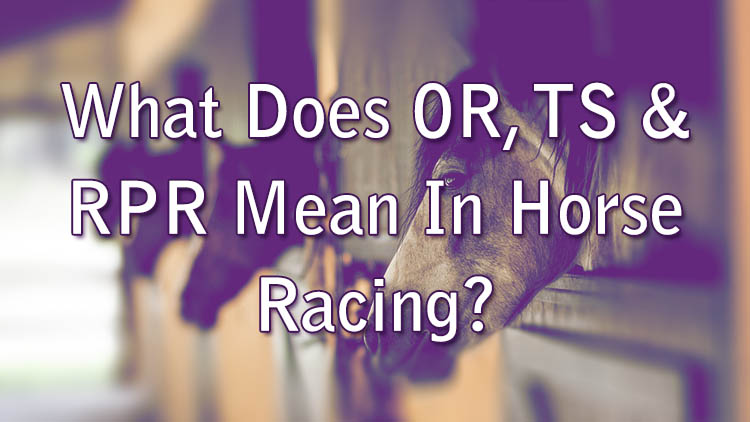
While horse racing can be filled with excitement and suspense, it's also a sport of numbers and ratings. The OR, TS, and RPR are some of the primary metrics used in the industry to try and gauge a horse's quality and potential performance in a race.
In this Wizard Slots blog, we will delve into these fascinating aspects of horse racing, providing a comprehensive understanding of these key terms.
OR Horse Racing Meaning
The "OR" in horse racing stands for "Official Rating". This rating is assigned by the British Horseracing Authority (BHA) and is used to weigh the horses in handicap races.
In essence, the OR is a measure of a horse's ability, with higher-rated horses perceived as more capable. The OR is calculated based on a horse's past performance, and a higher OR often means the horse will carry a heavier weight in a handicap race.
The OR forms an essential part of a horse's form guide, providing bettors with an insight into a horse's potential performance. However, it's important to remember that the OR is only one piece of the puzzle and should be considered alongside other factors like the horse's form, course, and distance preferences, and the quality of the opposition.
Racing Post Rating System Explained
The "RPR" or "Racing Post Rating" is another crucial metric in horse racing. This rating is computed by the Racing Post, a British daily horse racing, greyhound racing and sports betting publisher.
The RPR is a measure of a horse's ability in relation to the weight it carried in a race, with higher ratings indicating superior performance.
Unlike the OR, which is calculated by the BHA, the RPR is determined by a private handicapper who takes into account the most recent performances of a horse. This rating is expressed in pounds (lb), so a horse with an RPR of 140 is considered 10lb better than one with an RPR of 130.
The RPR is updated after each race and can fluctuate based on a horse's performance. A good RPR can be a strong indicator of a horse's potential in a race, but it's always crucial to consider other factors, like the horse's general form and the conditions of the race.
What Does TS Mean In Horse Racing?
TS stands for "Top Speed" in horse racing. This rating, which can also be provided by the Racing Post, is a measure of a horse's best speed figure, factoring in the distance of the race and the weight the horse carried. The TS can be a useful metric for comparing the raw speed of different horses, regardless of the conditions of their races.
The TS rating is derived by comparing the time a horse took to complete a race, against the standard time for that course and distance. Adjustments are then made based on a few factors such as the going (conditions underfoot), weight carried, and the nature of the race.
While a high TS rating can indicate that a horse has the potential for a good turn of speed, it's important to remember that horse racing is not just about speed. Stamina, tactical awareness, and a horse's ability to handle the conditions of a race are also crucial factors that can influence the outcome of a race.
What’s The Difference Between OR and RPR?
While both the OR and RPR are measures of a horse's ability, there are key differences between these two ratings.
The OR can be calculated by the BHA and is used to determine the weights horses carry in handicap races. On the other hand, the RPR is computed by a private handicapper at the Racing Post and is based on a horse's racing ability in relation to the weight it carried in a race.
The methods used to calculate these two ratings also differ. The OR is assigned based on a horse's past performances, while the RPR considers the most recent performances of a horse. Consequently, while the OR tends to be more stable, the RPR can fluctuate more depending on a horse's current form.
In conclusion, understanding the OR, TS, and RPR terms in horse racing can provide bettors with valuable insights, aiding them in making informed betting decisions. However, these ratings should not be considered in isolation. A comprehensive knowledge of other factors such as a horse's form, the conditions of a race, and the quality of the opposition is also crucial to try and successfully predict the outcome of a race.
Please gamble responsibly.
